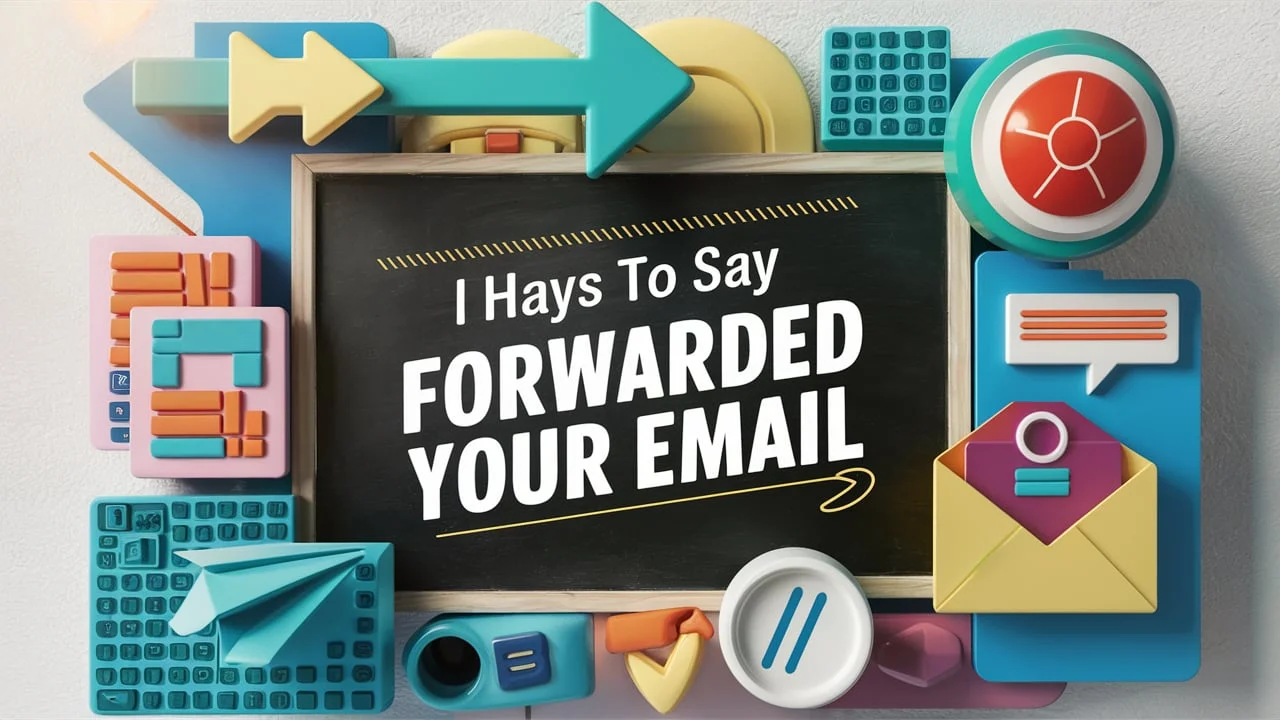In professional and casual communication, forwarding emails is a common task. However, repeatedly using the same phrase, such as “I have forwarded your email,” can sound monotonous and uninspired. To maintain a polished and engaging tone in your emails, it’s essential to vary your language. Whether you’re responding to a colleague, client, or manager, choosing the right alternative can enhance clarity and professionalism. Other Ways to Say “I Have Forwarded Your Email”.
This article explores 15 alternative ways to say “I have forwarded your email,” each offering a slightly different tone or level of formality. From direct and professional to warm and conversational, these variations can help you craft better email responses. By using alternative phrasing, you can ensure your messages remain fresh and engaging while maintaining professionalism. Read on to discover different ways to communicate that you’ve sent an email forward without sounding repetitive or robotic.
Your Email Has Been Forwarded
When you want to keep your response professional and straightforward, “Your email has been forwarded” is a great choice. It clearly informs the recipient that their message has been passed along without adding unnecessary details. This phrase works well in business communication, especially when updating a colleague or manager on an email’s status.
Additionally, this phrase maintains a neutral and objective tone. It avoids sounding too formal or casual, making it suitable for most workplace environments. If you’re handling multiple requests, this variation ensures clarity without overwhelming the recipient with too much information.
For example, you might say: “Your email has been forwarded to the appropriate team for review.” This keeps the message brief yet effective. Using variations of this phrase in your email communication can help maintain a smooth and professional workflow.
Read More: Synonyms for “Full Circle”
I Have Sent Your Email Along
For a slightly more conversational yet still professional tone, “I have sent your email along” works well. This phrase is simple and easy to understand while adding a touch of warmth. It reassures the recipient that their message is in the right hands without sounding too rigid.
This phrase is particularly useful in workplace settings where a friendly yet professional tone is appreciated. It can be used when forwarding emails to colleagues, supervisors, or external contacts. The phrase also implies that the email was sent with care, making it more personal than a purely robotic response.
For example, you could write: “I have sent your email along to the HR department, and they will get back to you soon.” This alternative maintains professionalism while ensuring the recipient feels heard and valued.
I Have Shared Your Email
When you want to emphasize that the email was distributed to relevant parties, “I have shared your email” is an effective choice. This phrase is ideal when forwarding an email to a group or a specific team that needs to be aware of the message’s content.
Unlike “forwarded,” which feels purely transactional, “shared” suggests an intentional action. It implies that the message was sent with purpose, ensuring that the recipient understands the importance of their communication. This phrase is particularly helpful in team-oriented work environments where collaboration is key.
For instance, you might say: “I have shared your email with the marketing team, and they will follow up shortly.” This variation keeps the tone professional while providing reassurance that the message has reached the right people.
I Have Passed Your Message Along
This alternative is useful when you want to sound polite and approachable. “I have passed your message along” is a great option when forwarding an email in a way that acknowledges the sender’s effort in reaching out.
The phrase maintains a warm and conversational tone while still being professional. It works well when communicating with clients, customers, or colleagues who prefer a more personal approach. By using “passed along,” you create a sense of connection and attentiveness in your response.
For example, you could write: “I have passed your message along to our support team, and they will assist you soon.” This version reassures the recipient while keeping the email light and engaging.
The Email Has Been Sent to the Right Person
Sometimes, you need to confirm that an email has reached the correct recipient. “The email has been sent to the right person” is an excellent phrase for this purpose. It reassures the sender that their message is in good hands and being handled by the appropriate individual or team.
This phrase is especially useful in situations where multiple departments or individuals may be involved in a request. It eliminates uncertainty and ensures clarity in communication. Whether dealing with customer inquiries, internal requests, or managerial tasks, this alternative keeps communication smooth.
An example response might be: “The email has been sent to the right person, and they will review it shortly.” This provides a sense of confidence and reliability in your email exchanges.
I Have Forwarded Your Email for Review
In professional settings, emails often need to be reviewed before action is taken. If that’s the case, “I have forwarded your email for review” is a precise and effective phrase to use. This alternative informs the recipient that their message is being evaluated and will receive attention.
This phrase is particularly useful when forwarding important documents, proposals, or sensitive information. It signals that the email is in progress and awaiting a response. It also sets expectations, ensuring that the recipient understands the next steps.
For example, you could write: “I have forwarded your email for review, and you will receive feedback soon.” This keeps communication professional and structured.
Your Email Has Been Directed to the Right Department
When forwarding an email to a specific department, this phrase helps ensure transparency. It reassures the sender that their message is being handled appropriately while keeping the response professional.
This phrase works well in corporate and customer service environments where inquiries must be routed correctly. It ensures that the sender knows their email is being addressed by the right team without unnecessary elaboration.
An example email might read: “Your email has been directed to the right department, and they will follow up shortly.” This approach maintains clarity and professionalism while keeping the recipient informed.
I Have Relayed Your Email to the Appropriate Party
Using “I have relayed your email to the appropriate party” adds a level of professionalism and formality to your communication. The word “relayed” suggests careful transmission of information, making it a great choice for business settings.
This phrase is particularly effective when forwarding emails that require attention from a specific person or team. It reassures the sender that their message has been handled appropriately while maintaining a polished and confident tone.
For example, you might say: “I have relayed your email to the appropriate party, and they will be in touch soon.” This version works well in client communication, corporate emails, and customer service responses.
Your Request Has Been Sent Forward
If the email contains a request or inquiry, “Your request has been sent forward” is a useful alternative. This phrase acknowledges that an action has been taken while keeping the response clear and concise.
This phrase is particularly useful in situations where requests need to be reviewed before approval. It conveys professionalism while subtly setting expectations for the next steps.
An example email might read: “Your request has been sent forward, and we will update you once a response is received.” This keeps the recipient informed without unnecessary details.
I Have Routed Your Email to the Concerned Team
When forwarding an email within a structured organization, “I have routed your email to the concerned team” is a precise and professional option. The word “routed” implies that the email has been intentionally directed to the right department for handling.
This phrase is particularly effective in technical, customer service, or managerial settings. It reassures the sender that their message has reached the relevant team and will be reviewed accordingly.
For example, you could write: “I have routed your email to the concerned team, and they will follow up shortly.” This alternative maintains professionalism while ensuring clarity in workplace communication.
These three additional alternatives help diversify your email phrasing while maintaining professionalism and clarity in different situations. Let me know if you need more!
I Have Directed Your Email to the Appropriate Contact
When forwarding an email, it’s often helpful to confirm that it has been sent to the right individual. “I have directed your email to the appropriate contact” conveys this clearly and professionally. This phrase is particularly useful in situations where different people handle different inquiries, ensuring that the sender knows their message is being handled by the right person.
This alternative is effective in customer service, corporate environments, and interdepartmental communication. It adds a sense of structure and confidence to your email response.
For example, you might write: “I have directed your email to the appropriate contact, and they will be in touch soon.” This response ensures the recipient feels informed and reassured.
I Have Forwarded Your Message for Further Handling
If an email requires action beyond just forwarding, “I have forwarded your message for further handling” is a great phrase to use. This wording suggests that the email has been passed along to someone who will take the necessary next steps.
This alternative is particularly effective when forwarding customer complaints, support requests, or inquiries that require additional processing. It reassures the sender that their message is not only received but also being actively handled.
For example, you could write: “I have forwarded your message for further handling, and our team will reach out shortly.” This phrase keeps communication professional and ensures clarity in email exchanges.
These two additional alternatives provide even more ways to keep your email responses professional, clear, and engaging. Let me know if you need more variations!
Conclusion
Finding different ways to say “I have forwarded your email” can enhance your professional communication and make your emails more engaging. Whether you prefer a formal, casual, or friendly tone, the alternatives discussed in this article provide plenty of options to suit different situations. By varying your wording, you can ensure your messages remain clear, professional, and impactful.
Using alternative phrases not only prevents repetitive communication but also helps maintain a positive and approachable tone. Whether you’re informing a client, coworker, or manager, choosing the right phrasing can make a difference in how your email is received. Try incorporating these variations in your emails to create more engaging and effective communication.

Christopher Miller is a language expert at WordSeekerz.com, dedicated to making English grammar and vocabulary simple and fun. Explore more at WordSeekerz.com and enhance your language skills today!










